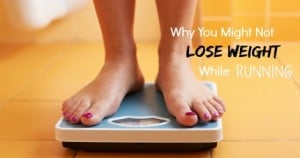Many runners want to lose weight while running. For some, it’s a primary objective, while it’s a great secondary benefit for others.
Regardless, it’s important that you approach weight loss while running carefully and with a specific plan in place.
If you don’t balance your caloric intake with your caloric expenditure carefully, you won’t have the energy to run hard and finish important workouts, or you’ll find yourself binging and losing all the weight loss gains you’ve made.
Losing Weight by the Numbers
It’s critical that you pay close attention to the number of calories you’re taking in (caloric intake) and the calories you’re using (caloric expenditure).
Caloric Intake – Most people know how to count calories – it’s as simple as looking at the nutrition label, measuring serving sizes, and keeping a running tally. The Internet is filled with many websites and mobile phone apps that can help with this process. My favorite is LIVESTRONG’s MyPlate, which has both an online site and web application. Not only will this help you easily track your calories, but it also gives you good information on what other nutrients you might be missing from your diet.
Caloric Expenditure – This is often the phase of losing weight that most people skip or have a hard time calculating. Luckily, I’ve made it easy for you with our handy calories burned from running calculator. Simply enter your weight, the total number of minutes you ran, and your average pace. You’ll instantly be provided with the total number of calories you’ve burned for the day.
Nab Our FREE 4-part Weight Loss Email Course
You’ll learn the science behind losing weight and still running well so you can understand the “why” of weight loss for long-term success.
Lessons include why simply running more and eating less won’t help you lose weight, why your weight fluctuates each day, and the best way to distribute calories throughout your day. Plus more…
Armed with all the information you need, you can start making a daily plan to slowly cut enough calories to lose weight while keeping your energy levels high enough to hit the hard workouts and recover properly.
Don’t try to lose too many calories too fast
By nature, runners are obsessive creatures.
When we want to lose weight, we just cut as many calories as we can and push through the fatigue – naively thinking we’re making progress.
If you want to maintain your training levels and make progress towards your running goals, it’s important that you don’t cut too many calories from each day.
You should aim to have a total deficit of 400-600 calories per day if you want to lose weight while running.
This number allows you to lose about one pound per week (it takes a loss of 3500 calories to lose one pound). I know it doesn’t sound like much, but this adds up over time and is critical if you want to train hard and achieve your running goals.
Here’s the deal:
Calories get a bad rap, but they’re actually a measurement of energy. Simply speaking, you need them to run hard.
If you don’t have enough energy to perform your hard running workouts, such as tempo runs and long runs, you miss the opportunity to make significant gains in fitness.
Losing an extra 1000 calories at the expense of a tempo run is a bad trade off. You missed an important opportunity to reach your time goal for 1/3rd a pound.
Furthermore, your body needs calories – specifically carbohydrates and proteins – to repair the muscle damage caused by working out hard.
You make gains in your fitness by first breaking down the muscles and then building them back up.
If you starve yourself of calories, your body can’t repair itself quickly. Consequently, you go into your next workout not fully recovered and run the risk of having another bad workout or tearing yourself down further.
Here’s the kicker:
Basically, you take two steps back for every three steps forward.
Other dangers of losing weight too fast
Losing more than a pound or two a week can not only be unhealthy to your running, but it will very likely cause you to lose muscle along with fat.
Not only is that bad because you need this muscle to run faster, but also because muscle is a metabolically active tissue (simply speaking, your body burns calories to sustain muscle, which results in a higher metabolism).
With your metabolism running slower as you have less muscle, you have to eat less and less to continue to lose weight.
Finally, it’s not that difficult to subtract 400-600 calories from your diet. Cut out the dessert or skip the soda or fruit drink and you’re basically there.
You might be wondering:
When you try to lose 1000-1500 calories per day, you have to sacrifice quality foods and you stay hungry. When you’re hungry, you’re more likely to binge on high calorie foods and have a day or two per week where you add 1000-1500 calories and take a big step backwards.
Sum it up
In short, carefully measure your caloric expenditure and keep track of your caloric intake. Aim for about a 400-600 calorie deficit and you’ll safely hit your weight loss goals while maintaining the energy you need to train and race hard.
If you are looking for more information about losing weight while running, we did a whole series on it. Check out our other posts on this topic:
More Weight= More Injuries? Why This is Not Correct
Marathon Training and Weight Gain
Running and Weight Loss: An In-Depth Look at the Relationship Between Exercise and Energy Balance
Understand How Metabolism Works to Unlock the Mystery of Running and Weight Loss
Low Fat Low-Fat Dairy and Weight Loss: Understanding the Role of Dairy in the Runner’s Diet





13 Responses
“By nature, runners are obsessive creatures.” – very true!
Just like pacing my runs and not overdoing it is a challenge, setting a goal to lose weight slowly is hard. It’s important to understand it will be more beneficial to longterm goals if I take it slow and just push through the pain of not getting there ASAP.
It can be challenging to match my weight loss goals with my running goals. Ultimately, the true goal is fitness and healthy lifestyle, not shedding pounds or shaving minutes off a race – those are just measurements.
Great perspective, Sarah. I am glad you liked the article and I appreciate you sharing your thoughts and experiences. I think it will help others realize they are not along and hopefully help them realize weight loss and race times are really just measurements. Best of luck and happy running!
I started training for a marathon and have kept my calories in total check. I like to be about 112-116lbs. I am now around the 118-119 mark. I log everything on myfitnesspal- but my question is if I stay around the 1200 calorie a day mark and do eat about 100/150 of my running calories, where do i subtract the 400-600 calories to lose weight? I would think that would be eating too little? Full disclosre I eat 170 calories of dark chocolate a night and a granola bar the afternoon, but otherwise my diet is very good (ok and on the weekends I imbibe and go out to eat…but that’s 1 night?)
You’re actually eating far too little. Your metabolism has effectively shut down. After a couple days of dieting, the metabolism slows down, hunger increases, and more and more muscle mass is sacrificed by the body for energy. The human body is very efficient at adapting to new conditions.
In short, when you cut calories as low as you have, thyroid hormone T3 levels drop by thirty percent; conversion from T4 to T3 in the liver is being slowed down, the half-life of cortisol increases and the production of Insulin like growth factor (IGF-1) is down.
With the reduced calories, leptin levels drop and appetite goes up. This means that a person who lowers his body fat is at an immediate disadvantage: His metabolism is automatically slowed down by as much as 30% within days, while suffering from hunger pangs.
So during a diet, all of a dieter’s nightmares come together: higher protein turnover combined with a lower levels of T3, IGF-1 (insulin like growth factor, one of the strongest muscle building hormones), leptin, and testosterone. Why is that a nightmare? Because not only will you not lose any more fat, you will actually be losing muscle.
The loss of muscle will create a skinny fat version of yourself, the type you can see on most treadmills in the country. All this happens despite training and after only several days, not months, of dieting. Very soon you’ll reach a plateau; no fat is lost and instead lean body mass is sacrificed.
I encourage you to eat far more and fuel your body for the training you need.
Thanks for the feedback. This is a bit new to me. I am going to add more caloreis into my diet and see how it goes. I thought it was odd that numbers were creeping up on the scale while I was working so hard. Thanks for the response.
“Losing an extra 1000 calories at the expense of a tempo run is a bad trade off. You missed an important opportunity to reach your time goal for 1/3rd a pound.”
Yep . . did this today. Run went awfully. I will not make this mistake again.
I have been running for about six weeks now and stepped it up since christmas in attempt to lose weight. I have put on 2.5 lbs this week after an intense week of running (34k) – so if it takes 3500 less calories to lose a lb. that means I have consumed 8750 extra calories to put on this weight. I am at a loss as to what to do
Great post thanks! I’m training for my first half marathon and the articles are great thank you. Especially like the running calories used calculator
I’m a runner and I agree that runners are very obsessive. We are hardwired to get the job done no matter what, as long as we get what we strive for and that is to be fit and in shape always.
Make a plan – If you want to lose weight, you need to make a plan for it. Planning involves setting your goals both short term and long term ones. With proper planning, you would be able to have an effective guide on the steps that you want to take, towards losing pounds of weight. Aside from that, it would also keep you motivated.
I am weighing 153pds and want to do a 1/2 marathon but I am stuck at the 4 mile mark and I don’t know why. I did have a hip flexor strain and now it is gone but sometimes I feel very heavy. Like today I ran for 2 miles and couldn’t go no further. I am eating eat 4 small meals a day consisting of fish, brown rice, green or yams. But I stop my carb intake at 3pm because I work nights from 4pm to 2:45am. How can lose weight and go up in my run? My calorie intake is is so clean that it comes up to about 600 to 70 calories a day. HELP!!!
Hi Yolanda, like we mentioned in the post, you need to try not to lose it too fast. You are not consuming enough calories for your body to handle running right now. Try to follow our recommendations and allow the weight to come off gradually. You have to decide what is more important, running or losing weight as you cannot do both with your current caloric intake. Good luck!